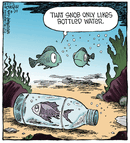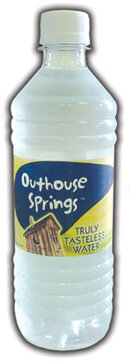- Messages
- 2,741
- Reaction score
- 769
- # of dives
- 500 - 999
I often just salt the fruit or veggies, since I really don't like chips.Deionized water is very expensive and so is distilled, and neither is either necessary or desirable for oral intake.
If you are replacing free water loss -- urine and insensible losses through skin -- for the most part, anything that is more dilute than blood will work (meaning anything other than salt water). The exception is people who are experiencing major exertion in hot, humid environments with enormous sweat losses, who absolutely need SOME salt.
If you want to expand volume, you need some salt with your water. Ideal would be 140 meq sodium per liter of water intake. Potassium is largely irrelevant to insensible losses, and only looms large when you are having vomiting or diarrhea. Other ions (Ca, Mg, PO4, etc.) are irrelevant to people in normal states of health.
In most cases, you do not want volume expansion per se, because the major sources of loss are not isosmotic with plasma. In other words, what you are losing through sweat, urine, and respiratory sources is more dilute than serum, so you actually need more free water. That's why water -- of any sort -- with a couple of pretzels is a reasonable recipe for hydration and volume repletion on the average dive boat. If you are afraid of the calories, salt your fruit or tomatoes or other fresh vegetable or fruit.
Here's some info on coconut water from Web MD. I know potassium is not supposed to be that important, but honestly, after having had heat exhaustion a few times, and dealing with the muscle cramps that comes with it, I've found it seems to help.
Expert Column
Low in calories, naturally fat- and cholesterol free, more potassium than four bananas, and super hydrating - these are just a few of the many benefits ascribed to America’s latest health craze: coconut water.
Dubbed "Mother Nature’s sports drink" by marketers, the demand is skyrocketing, propelled by celebrity and athlete endorsements and promises to hydrate the body and help with a whole host of conditions, from hangovers to cancer and kidney stones.
But is coconut water capable of delivering on all the promises or is it hype?
What Is Coconut Water?
Naturally refreshing, coconut water has a sweet, nutty taste. It contains easily digested carbohydrate in the form of sugar and electrolytes. Not to be confused with high-fat coconut milk or oil, coconut water is a clear liquid in the fruit’s center that is tapped from young, green coconuts.
It has fewer calories, less sodium, and more potassium than a sports drink. Ounce per ounce, most unflavored coconut water contains 5.45 calories, 1.3 grams sugar, 61 milligrams (mg) of potassium, and 5.45 mg of sodium compared to Gatorade, which has 6.25 calories, 1.75 grams of sugar, 3.75 mg of potassium, and 13.75 mg of sodium.
Better Than Some Sugary Drinks
Coconut water has less sugar than many sports drinks and much less sugar than sodas and some fruit juices. Plain coconut water could be a better choice for adults and kids looking for a beverage that is less sweet. But don’t overdo it, says Lillian Cheung, DSc, RD, of Harvard School of Public Health. “One 11-ounce container has 60 calories and if you drink several in one day, the calories can add up quickly," Cheung says.
Cheung, co-author of Savor Mindful Eating, Mindful Life, suggests being mindful about beverage choices and reading labels to choose plain coconut water and avoid those with added sugar or juices, which are no different from other sugary beverages.
I also enjoy Kombucha. I have no idea how helpful the probiotics are but the tart, slightly effervescent beverage is very thirst quenching and it is quite low in calories. 30 calories per serving if I remember right.





